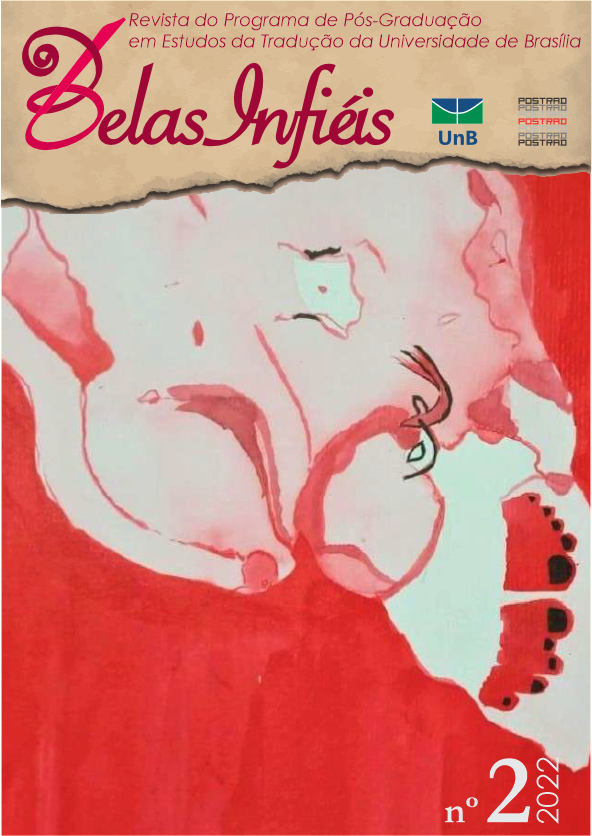Global Strategies for Theatre Adaptation: Feminisms on Stage in the Translation of The Vagina Monologues
DOI:
https://doi.org/10.26512/belasinfieis.v11.n2.2022.42336Keywords:
Adaptation. Theater translation. Body writing. Monologue. Intervention.Abstract
The Vagina Monologues is a theater play premiered in 1996 that became an international breakthrough for the feminist movement on stage, as it explores the female sexuality and denounces the violence against women. The present study addresses the play’s translation and adaptation through a comparative analysis of the script in English versus two performances in Spanish, one staged in Spain and the other one in Mexico. This research aims to propose a categorization of global strategies of theatrical adaptation, based on the classification of the resources used in both adaptations to appeal to a specific regional audience. The analysis is based on various studies in the field of theater translation, mainly the work by the Spanish translation scholar Julio-César Santoyo, and is approached from a feminist perspective, based on theories by the Cuban researcher Yanetsy Pino Reina. This work aims at rethinking the translation work as a driving force of change in artistic spaces and social movements.
Downloads
References
Castro, Olga & Spoturno, María Laura. (2020). Feminismos y traducción: apuntes conceptuales y metodológicos para una traductología feminista transnacional. Mutatis Mutandis. Revista Latinoamericana de Traducción, 13(1), 11–44. https://revistas.udea.edu.co/index.php/mutatismutandis/article/view/340988
de Toro, Fernando (1987). Texto, texto dramático y texto espectacular. Semiosis, (19), 101–128. https://cdigital.uv.mx/handle/123456789/6330
Egido, Aurora. (1989). La escenografía del teatro barroco. Universidad de Salamanca.
Ensler, Eve. (2004). The Vagina Monologues, Official guidelines and script for the V-Day 2004 College Campaign. Dramatists Play Service.
Fobbio, Laura. (2009). El monólogo dramático: interpelación e interacción. Comunicarte.
Lapeña, Alejandro. (2014). Recalificar el páramo. Bases para un nuevo modelo traductológico de análisis del texto teatral. Revistas de la Universidad de Granada, 25, 149–172. https://revistaseug.ugr.es/index.php/sendebar/article/view/650/2672
Matarredona, Jaime. (2 de febrero de 2019). Entrevista con el director. (Autora, Entrevistador)
Merriam-Webster. (s.f.). learnersdictionary.com. https://www.learnersdictionary.com/definition/cunt
Moscatel, Susana & Merino, Erick. (2019, enero 28). Los monólogos de la vagina. (Jaime Matarredona, Dirección) Teatro Libanés, Ciudad de México, México.
Pino Reina, Yanetsy. (2018). Hilando y deshilando la resistencia (pactos no catastróficos entre identidad femenina y poesía). Fondo Editorial Casa de las Américas.
Plata, Anna. (enero de 2002). Los monólogos de la vagina, de Eve Ensler. Planeta.
Real Academia Española. (s.f.). Diccionario de la lengua española. https://dle.rae.es/co%C3%B1o
Roca, José María. (enero de 2016). Los monólogos de la vagina. (José María Roca, Dirección) Palacio de los Marqueses de la Algaba, Sevilla. https://www.youtube.com/watch?v=3WoI0tVrGQ8&t=4120s
Santoyo, Julio-César. (1989). Traducciones y adaptaciones teatrales: ensayo de tipología. Cuadernos de teatro clásico, (4), 95–112. https://biblioteca.org.ar/libros/141547.pdf
V-Day. (2021). V-Day: Until the Violence Stops. https://www.vday.org/about-v-day/
Downloads
Published
How to Cite
Issue
Section
License
Copyright (c) 2022 CC BY

This work is licensed under a Creative Commons Attribution 4.0 International License.
Given the public access to this journal, the texts are free to use but requires the recognition of the original authorship and initial publication in this journal to be properly stated.
 The journal allows the use of works published for non-commercial purposes, including the right to submit the work to publicly accessible databases. Published contributions are the sole and exclusive responsibility of the author(s).Â



















